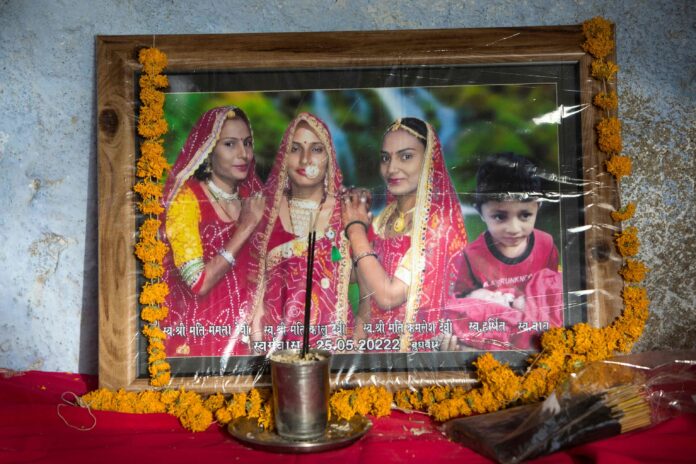After days missing, the Kalu sisters, Mamta Meena and Kamlesh were found dead in a well in India. Married to three brothers, her death reflects violence related to dowry, an illegal but entrenched practice.
Before dying, the victims left a message blaming their husbands’ families, with whom they had a dispute over the high sums of money that many Indian parents often pay to marry off their daughters.
Kalu (27 years old), Mamta (22) and Kamlesh (20) were found last month in Dudu, a village in the Rajasthan region (west), where they lived in the same house, constant victims of abuse by their husbands. and relatives, ensures his family.
Let’s die together because it’s better than dying every day
Their bodies were not alone. Also lying inert were Kalu’s two children, a four-year-old boy and a four-week-old baby. And the other two sisters were pregnant.
Shortly before she died, the youngest, Kamlesh, sent an accusatory WhatsApp message: “Our in-laws are behind our five deaths.”
“We do not want to die but death is better than abuse (…) We are going to die together because it is better than dying every day,” the text added.
Four days after finding them, her father, Sardar Meena, his wife, their eldest son and their three other daughters mourn under portraits of the deceased, placed on the stairs of the humble family home in Chhapya, a village near Dudu.
Police are treating the investigation as a suicide until autopsies arrive, an officer from the nearby city of Jaipur told AFP. But Meena has been accusing her sons-in-law of abuse and moral harassment for years.
Kalu was hospitalized in April after being beaten by her husband and family.
Those who demand a dowry are not good people (…) It is not human
“My daughters suffered violence and came here. But, despite the violence, they said that they had to return to the marital home and they returned with their husbands,” explains the father.
Since divorce is considered an infamy in much of India, Meena let them go and thus save her family’s honor.
“They were so mistreated,” agrees Sonu, sister of the deceased.
According to the father, one of the main reproaches of his in-laws was the poor dowry he had paid. “Those who demand a dowry are not good people… It’s not human,” he says.
The practice of dowry has been prohibited by law in India for more than 60 years, but this custom is deeply ingrained and is still very much alive.
Televisions, a refrigerator, furniture… “We have already given them so many things,” says the father. “I’m a father of six daughters, there are limits to what I can do,” he adds.
“I endowed them with an education, which is already difficult,” he says, proudly showing his university cards, later useless for the young women because their husbands forbade them to continue studying and working.
Following the events, police arrested the victims’ husbands, mother-in-law and sister-in-law for dowry-related harassment and spousal violence.
They are not unique cases. The local press often reports spousal violence and dowry disputes.
Last year, a man from the southern state of Kerala was sentenced to life in prison for killing his wife with a cobra bite to seize her assets after already getting a new car and more than $6,000.
Last week, a court in the same region sentenced a man to ten years in prison for driving his wife to suicide by also harassing her for her dowry.
Data from the National Office of Criminal Files indicates that almost 7,000 women were murdered and 1,700 committed suicide in 2020 over this issue.
The father: “I endowed them with an education, which is already difficult” he says proudly showing his university cards
A national study of family health indicated that 30% of married women have been victims of physical or sexual violence in marriage. And feminist activists believe that this is only the tip of the iceberg.
“Every hour, 30 to 40 women are victims of domestic violence,” Kavita Srivastava, from the PUCL human rights defense organization, told AFP, noting that these data are based on complaints filed with the police.
For her, the fundamental problem is the social indifference to conjugal violence in India: “so much resignation is very worrying”.
“If a single woman has to commit suicide because her married life is the end of the road, I think the Indian state has failed these women,” he says.
Conforms to The Trust Project criteria








